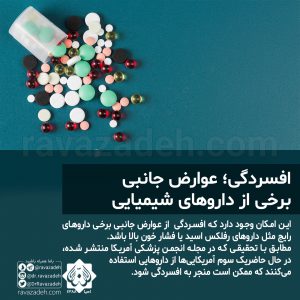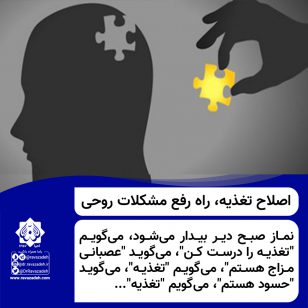ترجمه مقاله >> افسردگی؛ عوارض جانبی برخی از داروهای شیمیایی
این امکان وجود دارد که افسردگی از عوارض جانبی برخی داروهای رایج مثل داروهای رفلکس اسید یا فشار خون بالا باشد.
مطابق با تحقیقی که در مجله انجمن پزشکی آمریکا منتشر شده، در حال حاضریک سوم آمریکاییها از داروهایی استفاده میکنند که ممکن است منجر به افسردگی شود.
تمامی داروها دارای این توانایی بالقوه هستند که عوارض جنبی ناخواستهای را بوجود بیاورند و افسردگی نیز یکی از آنهاست. مطابق با مطالعات منتشر شده در مجله انجمن پزشکی آمریکا، در حال حاضر یک سوم از آمریکاییها از داروهایی استفاده میکنند که منجر به اختلال خلقی افسردگی میشود. سایر تحقیقات نیز یافتههای مشابهی داشتند ولی این مطالعه، بزرگترین بررسی در خصوص این موضوع تا کنون بوده است.
نویسندگان تحقیق دریافتند که در حدود 200 نسخه دارویی شامل داروهای رایجی که توسط بزرگسالان استفاده میشود مثل پروتون پامپ اینهبیتور (PPIs) برای بهبود ریفلاکس اسید و بتا بلاکرها برای فشار خون بالا، میتوانند منجر به افسردگی شوند.
ولی پزشکان ممکن است که این را ندانند. مطابق با گفته نویسنده مطالعه مارک الفسان، استاد روانشناسی و اپیدومولوژی دانشگاه کلمبیا مرکز دارویی ایروینگ در نیویورک،” ممکن است بسیاری از پزشکان از این که بسیاری از داروهای تجویزی با افزایش ریسک ابتلا به این اختلال خلقی ارتباط دارند، آگاه نباشند”. مطابق با یافتههای تحقیق، میزان مصرف بیشتر دارو با خطر افزایش ابتلا به افسردگی در ارتباط بود. در حدود 7 درصد از افرادی که حداقل یکی از داروها را استفاده کرده بودند، افسرده بودند در مقایسه با 3/15 درصد از افرادی که حداقل 3 دارو را استفاده کرده بودند.
مطابق با گفته های مایکل هوکمن، استادیار پزشکی بالینی در کک مدیسین در دانشگاه کالیفرنیای جنوبی در لس آنجلس نگرانی در مورد افراد مسن بیشتر است. زیرا آنها ممکن است در یک زمان از چند دارو استفاده کنند و در مقابل عوارض جانبی داروها، آسیب پذیر تر شوند.
الفسون میگوید:” ولی حتی اگر از داروهایی استفاده میکنید که با افسردگی ارتباط دارند، آنها لزوما عامل افسردگی نیستند. به خاطر داشته باشید که بیشتر افرادی که از این داروها استفاده میکنند، حتی آنهایی که 2 یا تعداد بیشتری از این داروها را استفاده میکنند، افسرده نیستند”.
ایگور گالینکر استاد رانشناسی در مدرسه داروسازی ایکان در مونت سینای در نیویورک در این خصوص توضیح میدهد: “بعضی وقتها، افراد قبل از شروع استفاده از داروی خاصی افسرده بودند یا شرایط سلامتی مختلف آنها را افسرده کرده است”. مثلاً بیشتر افراد مبتلا به دردهای مزمن مبتلا به افسردگی یا سایر اختلالات خلقی هستند. زیرا قسمتی از مغز که درد را درک میکند نیز بر خلق و خو تاثیر گذار است.
ولی همچنان هوشمندانه است که ارتباط را مدنظر قرار دهیم و بدانیم که یک دارو ممکن است بر خلق و خوی شما تاثیر بگذارد.
داروهایی که ممکن است منجر به افسردگی شوند
استفاده از داروهای زیر ممکن است منجر به افسردگی شوند:
1- بتا بلاکرهاBeta blockers – (داروی کاهنده فشار خون): متوپرورولmetoprolol، آتنولول atenolol ، انالاپریل enalapril و کویین آپریل quinapril
2-داروهای ضد افسردگی: سرتارالین sertraline( زلفت Zoloft و عمومی)، سیتالپرام citalopram ( سلکساCelexa و عمومی)، باپروپشن bupropion( ولباترین Wellbutrin و عمومی) و امیتریپتیلین amitriptyline
3-داروهای ضد اضطراب: آلپرازولام alprazolam (زاناکسXanax و عمومی)، کلونازپام clonazepam(کلنوپین و عمومی)، دیازپام diazepam (والیوم و عمومی)، سداتیو زلپیدم sedative zolpidem ( آمبین Ambien و عمومی).
4- اپییودز: داروهای ترکیبی هیدرو کدن (لرکت Lorcet، نرکوNorco، ویکدین Vicodin عمومی و بیشتر) و ترامادول tramadol (کنزیپ ConZip)
5-کورتیکواستروئیدها Corticosteroids: پردنیسون prednisone و سایر
6-مهار کنندههای پروتن پمپ proton-pump: امپرازول omeprazole (پاریلوسکPrilosec، زگرید Zegerid)و اسومپرازول esomeprazole( زانتاکZantac و عمومی) و فاموتیدین famotidine( پپسیدPepcid و عمومی)
7- داروهای آلرژی وآسم :سیتریزین cetirizine (زیرتک Zyrtec و عمومی) و داروی تجویزی منتلوکاست montelukast (به تنهایی)
8- داروهای ضد انعقاد : گاباپنتین gabapentin ( نیوروتین Neurontin) و تپیرامات topiramate(تپیماکس Topamax و عمومی)
9- هورمونها: استرادییول estradiol (دلسترژن Delestrogen، السترینElestrin، استروژل EstroGel و عمومی) و فیناسترید finasteride(پروسکارProscar، پروپکیاPropecia)
خلق و خود را بررسی کنید
این که شما چند دارو مصرف میکنید یا دارو مصرف نمیکنید، در صورتی که به مدت 2 هفته یا بیشترپشت سر هم احساس ناخوش خلقی دارید، به پزشک مراجعه کنید.
سایر نشانههای افسردگی عبارتند از تمایل نداشتن به شرکت در فعالیتهای خوشایندتان، تغییر اشتها یا تغییر وزن، بیخوابی یا خواب بیش از حد، احساس بی ارزش بودن و فکر دائمی نسبت به مرگ یا خود کشی. به گفته الفسون تا زمان پرسش پزشک در باره خلق و خویتان در مراجعه بعدی صبر نکنید. در مطالعهای که در سیچیارتی آنلاین در 2018 منتشر گردید، فقط 3 درصد از مراجعه کنندگان اولیه شامل بررسی افسردگی بود.
داروهای خود را چک کنید
به گفته جان بایرد مدیر امور داروسازی و امور دولتی در انجمن متخصصین مشاوران آمریکایی :وقتی با پزشکتان صحبت میکنید از او بپرسید که آیا امکان دارد داروهای شما علت افسردگی باشد. به همراه داشتن تمامی نسخههای خود را به خاطر داشته باشید تا پزشکتان بتواند تمامی آنها را مد نظر قرار دهد. در صورتی که پزشکتان به عوارض جانبی نپرداخته باشد، با داروسازی که دارو را از او گرفته اید ملاقات کنید.
داروهای جدید را بیشتر مدنظر قرار دهید
الفسون میگوید: وقتی نشانههای افسردگی مرتبط با دارو در هر زمانی پدیدار میشود، با احتمال زیاد در اولین ماه استفاده متوجه نشانهها میشوید.
بنابراین هر زمانی که پزشک داروی جدیدی را تجویز کرد از او بپرسید که آیا افسردگی از اثرات جانبی این دارو هست یا نه. در صورت مثبت بودن پاسخ، دفتری بردارید و در این صورت تمام اثرات مرتب با خلق و خو را شامل روز و ساعت وقوع نشانه را در ان یادداشت کنید. هرگونه نشانهای را که بیش از یک یا دو هفته در شما وجود داشته باشد را به پزشک گزارش کنید.
در خصوص تغییر داروها سوال کنید
فیلیپ ماسکین استاد روانپزشکی در مرکز پزشکی ایروینگ دانشگاه کلمبیا میگوید در صورتی که دارو عامل افسردگی است با دکتر خود صحبت کنید. بعضی وقتها راه چاره به سادگی کاهش دوز مصرفی است.
اگر دوز پایین تر تفاوت اندکی ایجاد میکند یا برای سلامتی شما خوب عمل نمی کند، پزشک باید داروهای دیگری را برایتان تجویز کند.
بسته به شرایط سلامتی، ممکن است مصرف دارو را متوقف کنید ولی مصرف هیچ دارویی را بدون مشورت پزشک متوقف نکنید.
خط مشیهای سبک زندگی را مدنظر قرار دهید
در صورتی که نمیتوانید مصرف یک دارو را بدون خطر کاهش دهید یا متوقف نمایید از پزشک خود در مورد سایر راههایی که میتوانید به خلق و خوی سابق خود برگردید صحبت کنید.
در یکی از مطالعات مرکز دارویی جنوب غربی تگزاس که در سال 2011 در مجله روانپزشکی بالینی منتشر گردید، 28در درصد از افراد ناتوان که برای افسردگی مورد معالجه قرار گرفته بودند، سه ماه پس از آغاز پیاده روی ملایم یا سریع بهبودهایی دیده شد.
قدم بعدی میتواند گفتار درمانی باشد به خاطر داشته باشید که بعضی از داروهای ضد افسردگی منجر به اضطراب میشوند.
در ذیل متن اصلی این مقاله ارائه می گردد:
Depression may be a side effect of some common drugs, including ones for acid reflux and hypertension
One-third of Americans are now taking meds that can cause depression, according to a study in the Journal of the American Medical Association. (iStock)
December 24, 2018
Consumer Reports has no financial relationship with any advertisers on this site.
All medications have the potential to cause unwanted side effects, and depression is among them. One-third of Americans are now taking meds that can cause this mood disorder, according to a study published in the Journal of the American Medical Association in June. Other research has had similar findings, but this is the largest review on the topic to date.
The study authors found that about 200 prescription drugs, including some often used by older adults — such as proton-pump inhibitors (PPIs) to treat acid reflux and beta blockers for hypertension — can lead to depression.
But doctors may not know this. “Many physicians may not be aware that several commonly prescribed medications are associated with an increased risk of this disorder,” says study author Mark Olfson, professor of psychiatry and epidemiology at the Columbia University Irving Medical Center in New York.
In the study, the more drugs people took, the higher their depression risk. About 7 percent of those taking one such drug were depressed compared with 15.3 percent of those taking at least three.
This is concerning for older adults, who may take multiple medications and are more vulnerable to drug side effects, says Michael Hochman, an associate professor of clinical medicine at Keck Medicine at the University of Southern California in Los Angeles.
But even if you’re taking medications linked to depression, they’re not necessarily the cause. “It’s important to bear in mind that most people taking these medications, even those who are on three or more of them, don’t have depression,” Olfson says.
“Sometimes, people were depressed before they started medications, or various health conditions have left them depressed,” explains Igor Galynker, professor of psychiatry at the Icahn School of Medicine at Mount Sinai in New York.
For instance, up to half of people with chronic pain also have depression or another mood disorder — because parts of the brain that are involved in perceiving pain also affect mood.
Still, it’s wise to keep the connection in mind, and to know when a drug might be affecting your mood.
Drugs that may cause depression
The following are among those that may lead to depression:
- Beta blockers and angiotensin-converting-enzyme inhibitors (blood pressure drugs): metoprolol, atenolol, enalapril and quinapril.
- Antidepressants: sertraline (Zoloft and generic), citalopram (Celexa and generic), bupropion (Wellbutrin and generic) and amitriptyline.
- Anti-anxiety drugs: alprazolam (Xanax and generic), clonazepam (Klonopin and generic), diazepam (Valium and generic), and lorazepam (Ativan and generic), as well as the sedative zolpidem (Ambien and generic).
- Opioids: hydrocodone combination meds (Lorcet, Norco, Vicodin, generic and more) and tramadol (ConZip).
- Corticosteroids: prednisone and others.
- Over-the-counter proton-pump inhibitors: omeprazole (Prilosec, Zegerid and generic) and esomeprazole (Nexium and generic), as well as the antacids ranitidine (Zantac and generic) and famotidine (Pepcid and generic).
- Allergy and asthma medications: over-the-counter cetirizine (Zyrtec and generic) and the prescription drug montelukast (Singulair).
- Anticonvulsants: gabapentin (Neurontin and generic) and topiramate (Topamax and generic).
- Hormones: estradiol (Delestrogen, Elestrin, EstroGel and generic) and finasteride (Proscar, Propecia and generic).
Monitor your mood
Whether you take multiple meds or none, if you’re experiencing a low mood for two consecutive weeks or more, let your doctor know.
Other depression symptoms to watch for include loss of interest in pleasurable activities, appetite or weight changes, insomnia or sleeping too much, severe fatigue, trouble concentrating, feeling worthless, and recurrent thoughts of death or suicide.
Don’t wait for your doctor to ask about your mood at your next visit, Olfson says. In one study published in Psychiatry Online in 2018, only about 3 percent of primary-care visits included a depression screening.
You can also take an online test, such as the PHQ-9, says Michelle Riba, associate director of University of Michigan Comprehensive Depression Center in Ann Arbor.
Check your meds
When you talk to your doctor, ask whether any of your meds could be the cause. And consider bringing all your regular prescription and OTC medications with you so that your doctor can look them over. (You should do this kind of “brown-bag review” at least once a year, whether you’re feeling depressed or not.)
If your physician doesn’t seem well versed in the side effects of your medications, make an appointment with the pharmacist where you get prescriptions filled, says Joan Baird, director of pharmacy practice and government affairs at the American Society of Consultant Pharmacists.
Watch closely with new meds
While drug-related depression symptoms can crop up at any time, you’re most likely to see them within the first month of use, Olfson says.
So every time your physician prescribes a new medication, ask whether depression is a possible side effect. If so, keep a journal so that you can jot down any mood-related side effects you notice, including the day and time when symptoms occur. Report any symptoms that persist for more than a week or two to your doctor immediately.
Ask about changing meds
If medication seems to be the cause, talk to your doctor. Sometimes the fix is as simple as cutting the dose.
If the lower dose makes little difference in mood or doesn’t work well for your physical health, your doctor should switch you to another class of drugs, says Philip Muskin, professor of psychiatry at Columbia University Irving Medical Center.
Depending on your health status, you may be able to stop taking a medication altogether — but never stop a regular prescription drug without discussing it with your doctor.
Consider lifestyle strategies
If you can’t safely reduce a dose or stop taking a medication, ask your doctor about other ways to get your mood back to baseline.
One 2011 University of Texas Southwestern Medical Center study published in the Journal of Clinical Psychiatry found that 28 percent of sedentary people being treated for depression reported improvements in their condition three months after beginning moderate or brisk walking routines.
The next step might be talk therapy — or, if your depression doesn’t ease sufficiently, antidepressant medication. Keep in mind that some antidepressants may trigger anxiety.
Copyright 2018, Consumer Reports Inc.
Read more
6 important questions to ask yourself about all the drugs you take
Side effects can develop even if you’ve been taking a pill for a long time
Tremors don’t mean you have Parkinson’s
Consumer Reports is an independent, nonprofit organization that works side by side with consumers to create a fairer, safer, and healthier world. CR does not endorse products or services, and does not accept advertising. Read more at ConsumerReports.org.












